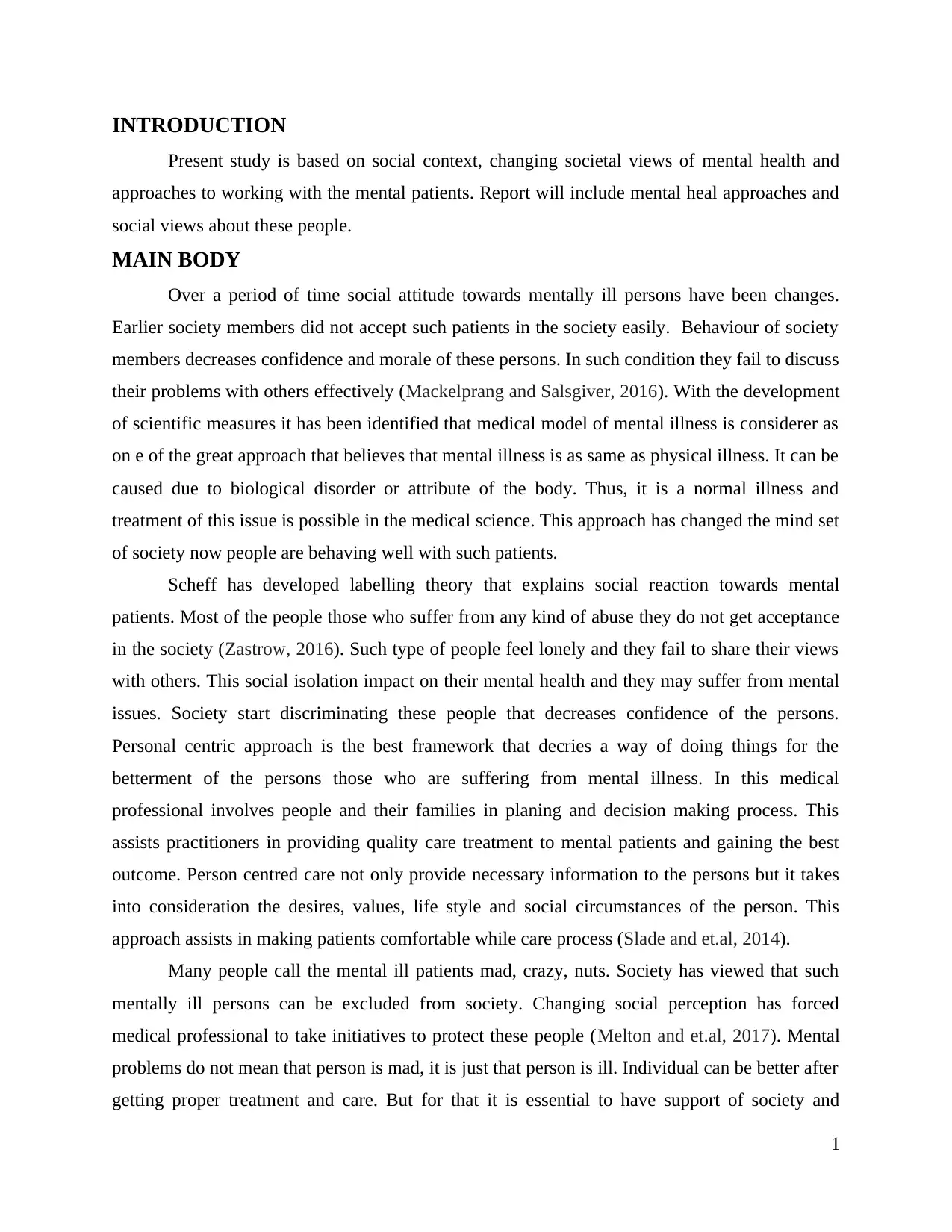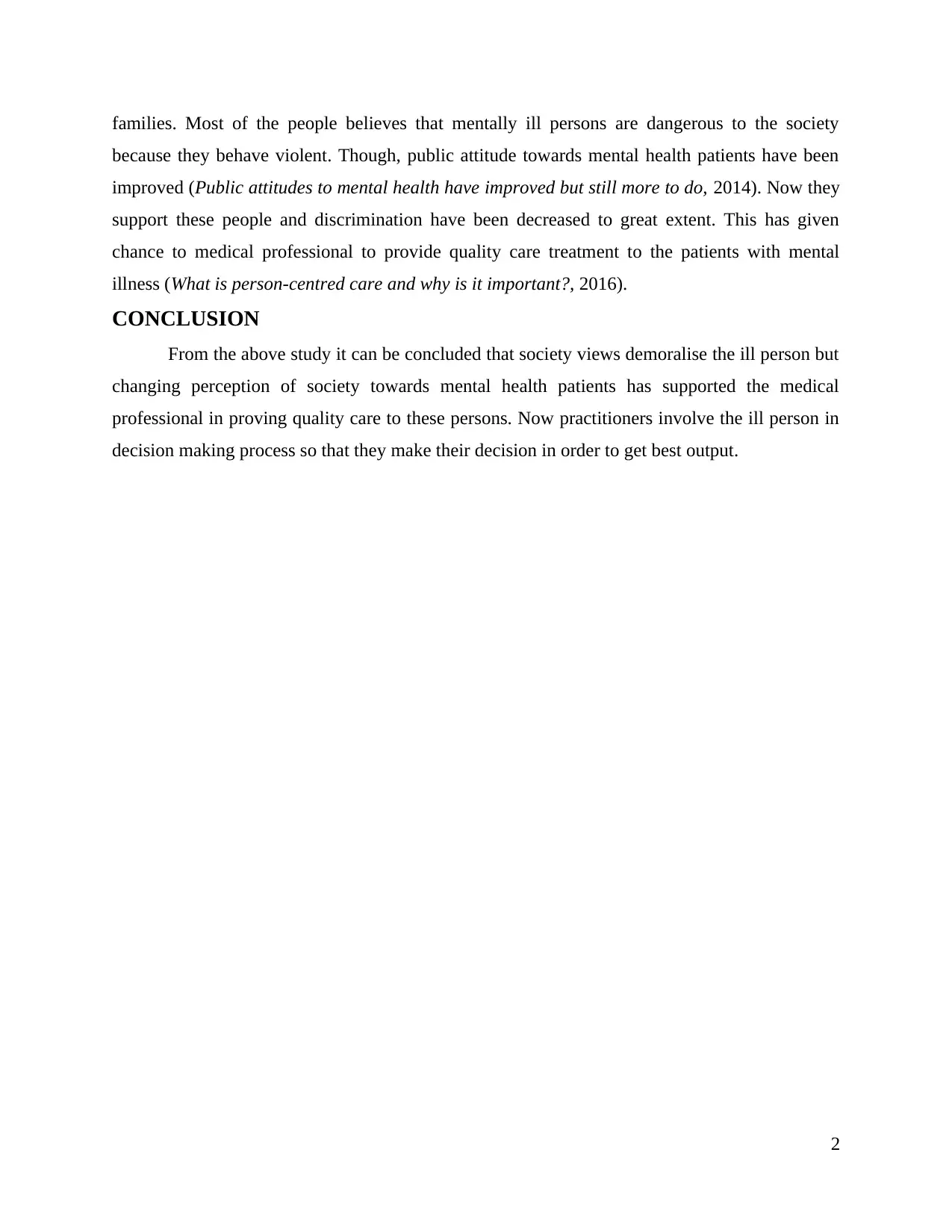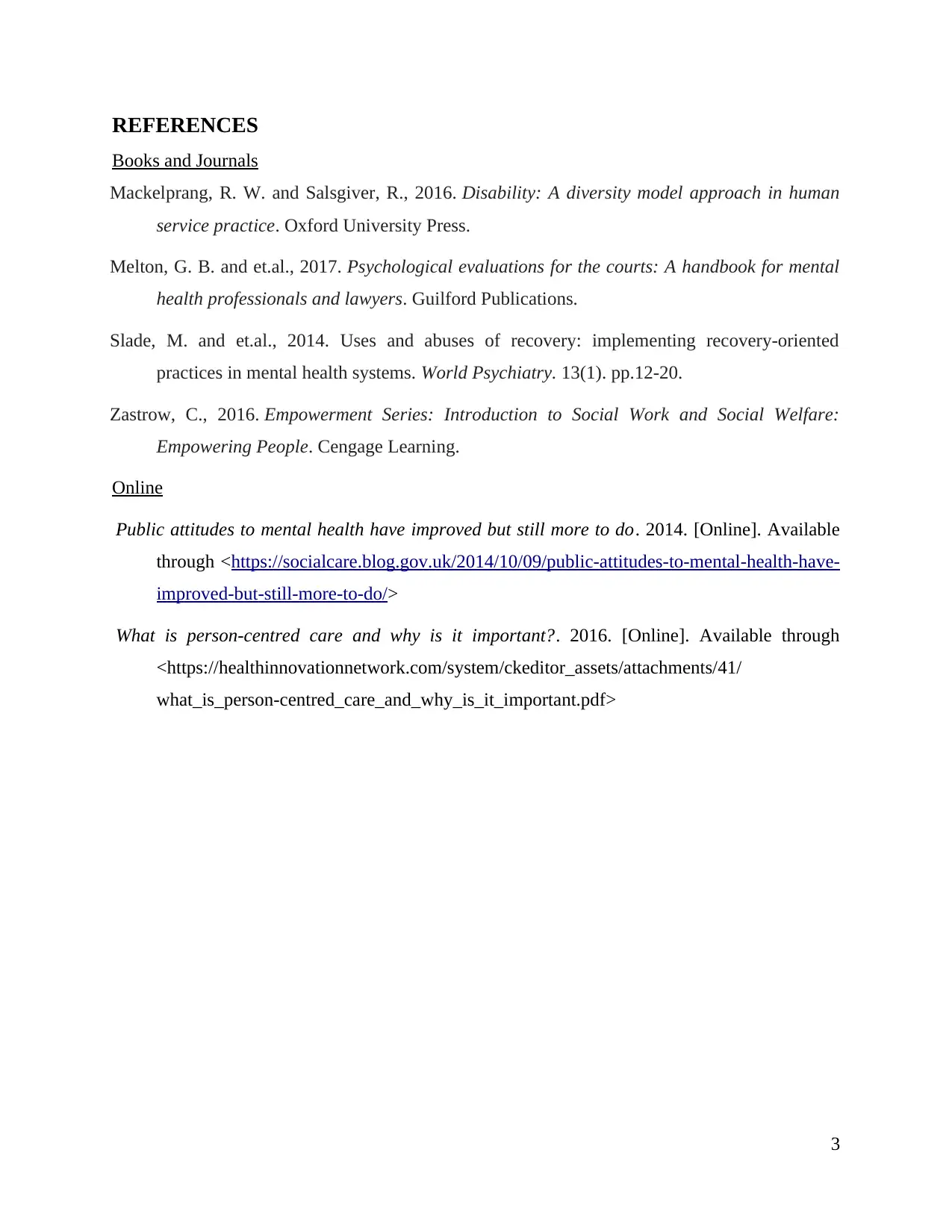Mental Health: Examining Social Attitudes and Patient-Centered Care
VerifiedAdded on 2020/06/06
|5
|805
|30
Report
AI Summary
This report examines the social context surrounding mental health, highlighting the evolving societal views and various approaches to working with mental health patients. It discusses how social attitudes towards individuals with mental illness have shifted over time, from initial rejection to increased acceptance due to scientific advancements and the medical model of mental illness. The report also touches on Scheff's labeling theory and the impact of social isolation on mental health, emphasizing the importance of person-centered care that involves patients and their families in decision-making processes. It concludes that while societal perceptions have improved, continued support and understanding are crucial for providing quality care and treatment to individuals with mental illness, encouraging a more inclusive and supportive environment.

MENTAL HEALTH
Paraphrase This Document
Need a fresh take? Get an instant paraphrase of this document with our AI Paraphraser

Table of Contents
INTRODUCTION...........................................................................................................................1
MAIN BODY...................................................................................................................................1
CONCLUSION................................................................................................................................2
REFERENCES................................................................................................................................3
INTRODUCTION...........................................................................................................................1
MAIN BODY...................................................................................................................................1
CONCLUSION................................................................................................................................2
REFERENCES................................................................................................................................3

INTRODUCTION
Present study is based on social context, changing societal views of mental health and
approaches to working with the mental patients. Report will include mental heal approaches and
social views about these people.
MAIN BODY
Over a period of time social attitude towards mentally ill persons have been changes.
Earlier society members did not accept such patients in the society easily. Behaviour of society
members decreases confidence and morale of these persons. In such condition they fail to discuss
their problems with others effectively (Mackelprang and Salsgiver, 2016). With the development
of scientific measures it has been identified that medical model of mental illness is considerer as
on e of the great approach that believes that mental illness is as same as physical illness. It can be
caused due to biological disorder or attribute of the body. Thus, it is a normal illness and
treatment of this issue is possible in the medical science. This approach has changed the mind set
of society now people are behaving well with such patients.
Scheff has developed labelling theory that explains social reaction towards mental
patients. Most of the people those who suffer from any kind of abuse they do not get acceptance
in the society (Zastrow, 2016). Such type of people feel lonely and they fail to share their views
with others. This social isolation impact on their mental health and they may suffer from mental
issues. Society start discriminating these people that decreases confidence of the persons.
Personal centric approach is the best framework that decries a way of doing things for the
betterment of the persons those who are suffering from mental illness. In this medical
professional involves people and their families in planing and decision making process. This
assists practitioners in providing quality care treatment to mental patients and gaining the best
outcome. Person centred care not only provide necessary information to the persons but it takes
into consideration the desires, values, life style and social circumstances of the person. This
approach assists in making patients comfortable while care process (Slade and et.al, 2014).
Many people call the mental ill patients mad, crazy, nuts. Society has viewed that such
mentally ill persons can be excluded from society. Changing social perception has forced
medical professional to take initiatives to protect these people (Melton and et.al, 2017). Mental
problems do not mean that person is mad, it is just that person is ill. Individual can be better after
getting proper treatment and care. But for that it is essential to have support of society and
1
Present study is based on social context, changing societal views of mental health and
approaches to working with the mental patients. Report will include mental heal approaches and
social views about these people.
MAIN BODY
Over a period of time social attitude towards mentally ill persons have been changes.
Earlier society members did not accept such patients in the society easily. Behaviour of society
members decreases confidence and morale of these persons. In such condition they fail to discuss
their problems with others effectively (Mackelprang and Salsgiver, 2016). With the development
of scientific measures it has been identified that medical model of mental illness is considerer as
on e of the great approach that believes that mental illness is as same as physical illness. It can be
caused due to biological disorder or attribute of the body. Thus, it is a normal illness and
treatment of this issue is possible in the medical science. This approach has changed the mind set
of society now people are behaving well with such patients.
Scheff has developed labelling theory that explains social reaction towards mental
patients. Most of the people those who suffer from any kind of abuse they do not get acceptance
in the society (Zastrow, 2016). Such type of people feel lonely and they fail to share their views
with others. This social isolation impact on their mental health and they may suffer from mental
issues. Society start discriminating these people that decreases confidence of the persons.
Personal centric approach is the best framework that decries a way of doing things for the
betterment of the persons those who are suffering from mental illness. In this medical
professional involves people and their families in planing and decision making process. This
assists practitioners in providing quality care treatment to mental patients and gaining the best
outcome. Person centred care not only provide necessary information to the persons but it takes
into consideration the desires, values, life style and social circumstances of the person. This
approach assists in making patients comfortable while care process (Slade and et.al, 2014).
Many people call the mental ill patients mad, crazy, nuts. Society has viewed that such
mentally ill persons can be excluded from society. Changing social perception has forced
medical professional to take initiatives to protect these people (Melton and et.al, 2017). Mental
problems do not mean that person is mad, it is just that person is ill. Individual can be better after
getting proper treatment and care. But for that it is essential to have support of society and
1
⊘ This is a preview!⊘
Do you want full access?
Subscribe today to unlock all pages.

Trusted by 1+ million students worldwide

families. Most of the people believes that mentally ill persons are dangerous to the society
because they behave violent. Though, public attitude towards mental health patients have been
improved (Public attitudes to mental health have improved but still more to do, 2014). Now they
support these people and discrimination have been decreased to great extent. This has given
chance to medical professional to provide quality care treatment to the patients with mental
illness (What is person-centred care and why is it important?, 2016).
CONCLUSION
From the above study it can be concluded that society views demoralise the ill person but
changing perception of society towards mental health patients has supported the medical
professional in proving quality care to these persons. Now practitioners involve the ill person in
decision making process so that they make their decision in order to get best output.
2
because they behave violent. Though, public attitude towards mental health patients have been
improved (Public attitudes to mental health have improved but still more to do, 2014). Now they
support these people and discrimination have been decreased to great extent. This has given
chance to medical professional to provide quality care treatment to the patients with mental
illness (What is person-centred care and why is it important?, 2016).
CONCLUSION
From the above study it can be concluded that society views demoralise the ill person but
changing perception of society towards mental health patients has supported the medical
professional in proving quality care to these persons. Now practitioners involve the ill person in
decision making process so that they make their decision in order to get best output.
2
Paraphrase This Document
Need a fresh take? Get an instant paraphrase of this document with our AI Paraphraser

REFERENCES
Books and Journals
Mackelprang, R. W. and Salsgiver, R., 2016. Disability: A diversity model approach in human
service practice. Oxford University Press.
Melton, G. B. and et.al., 2017. Psychological evaluations for the courts: A handbook for mental
health professionals and lawyers. Guilford Publications.
Slade, M. and et.al., 2014. Uses and abuses of recovery: implementing recovery‐oriented
practices in mental health systems. World Psychiatry. 13(1). pp.12-20.
Zastrow, C., 2016. Empowerment Series: Introduction to Social Work and Social Welfare:
Empowering People. Cengage Learning.
Online
Public attitudes to mental health have improved but still more to do. 2014. [Online]. Available
through <https://socialcare.blog.gov.uk/2014/10/09/public-attitudes-to-mental-health-have-
improved-but-still-more-to-do/>
What is person-centred care and why is it important?. 2016. [Online]. Available through
<https://healthinnovationnetwork.com/system/ckeditor_assets/attachments/41/
what_is_person-centred_care_and_why_is_it_important.pdf>
3
Books and Journals
Mackelprang, R. W. and Salsgiver, R., 2016. Disability: A diversity model approach in human
service practice. Oxford University Press.
Melton, G. B. and et.al., 2017. Psychological evaluations for the courts: A handbook for mental
health professionals and lawyers. Guilford Publications.
Slade, M. and et.al., 2014. Uses and abuses of recovery: implementing recovery‐oriented
practices in mental health systems. World Psychiatry. 13(1). pp.12-20.
Zastrow, C., 2016. Empowerment Series: Introduction to Social Work and Social Welfare:
Empowering People. Cengage Learning.
Online
Public attitudes to mental health have improved but still more to do. 2014. [Online]. Available
through <https://socialcare.blog.gov.uk/2014/10/09/public-attitudes-to-mental-health-have-
improved-but-still-more-to-do/>
What is person-centred care and why is it important?. 2016. [Online]. Available through
<https://healthinnovationnetwork.com/system/ckeditor_assets/attachments/41/
what_is_person-centred_care_and_why_is_it_important.pdf>
3
1 out of 5
Related Documents
Your All-in-One AI-Powered Toolkit for Academic Success.
+13062052269
info@desklib.com
Available 24*7 on WhatsApp / Email
![[object Object]](/_next/static/media/star-bottom.7253800d.svg)
Unlock your academic potential
Copyright © 2020–2025 A2Z Services. All Rights Reserved. Developed and managed by ZUCOL.





